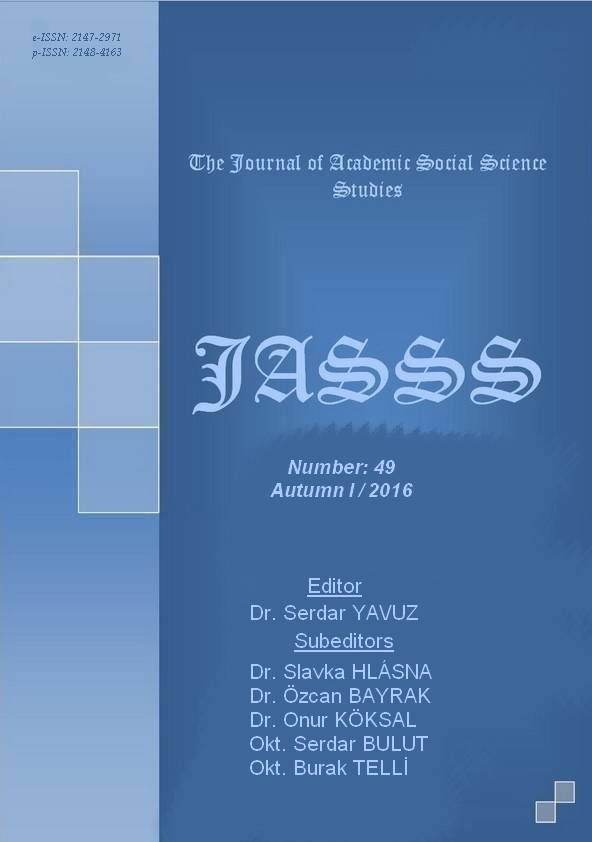Author :
Abstract
Türkiye’de ortaokullarda 1973-1974 öğretim yılından itibaren okutulan Sosyal Bilgiler dersleri 1985-1986 öğretim yılından itibaren kaldırılarak yerine Milli Tarih, Milli Coğrafya ve Vatandaşlık Bilgisi dersleri okutulmaya başlanmıştır. 1997 yılında zorunlu temel eğitimin sekiz yıla çıkarılmasından sonra ilköğretim okullarının haftalık ders çizelgeleri ve öğretim programları yeniden düzenlenmiştir. Bu düzenlemeler kapsamında ortaokullarda okutulmakta olan Milli Tarih ve Milli Coğrafya dersleri kaldırılarak yerlerine 1998-1999 öğretim yılından itibaren ilköğretim okullarının 4.-7. sınıflarında haftada üçer saat Sosyal Bilgiler dersi okutulmaya başlanmıştır. Bu araştırmanın amacı Milli Tarih dersinin yerine Sosyal Bilgiler dersi okutulmasının ilköğretim düzeyinde tarih öğretimi üzerindeki etkisini program boyutuyla ortaya koymaktır. Tarama modeli ve doküman incelemesi yöntemi kullanılan araştırma sonucunda Milli Tarih dersi yerine okutulan Sosyal Bilgiler dersi öğretim programında yer verilen Türk devletlerinin sayısında küçük bir azalma olmasına rağmen Türk kültür ve uygarlığıyla ilgili konulara ayrılan yer ile Anadolu uygarlıkları, eskiçağ uygarlıkları ve Avrupa tarihine ayrılan yerin genişlediği anlaşılmıştır. Araştırma sonucunda ortaokullarda Milli Tarih derslerinin kaldırılarak yerine Sosyal Bilgiler dersinin okutulmaya başlanmasının ilköğretim düzeyinde tarih öğretiminde bir anlayış değişikliği yaratmadığı, ilköğretimde tarih öğretiminde Milli Tarih dersi programıyla başlayan ulusal ve Türk tarihini merkeze alan yaklaşım ile Türk-İslam sentezi ağırlıklı konu yapısının bu programda da devam ettiği sonucuna ulaşılmıştır. Bu nedenle ilköğretim Sosyal Bilgiler öğretim programını kendisinden önce uygulanan Milli Tarih dersi öğretim programının mantıksal bir devamı olarak değerlendirmek mümkündür.
Keywords
Abstract
Social Studies courses which were taught in middle schools since the 1973-1974 academic year in Turkey were removed as of the 1985-1986 academic year, and National History, National Geography, and Civics courses began to be taught instead of them. After compulsory basic education had been increased to eight years in 1997, the weekly course schedules and the curriculum of primary education schools were rearranged. As a part of these regulations, National History and National Geography courses which were taught in middle schools were removed, and Social Studies course began to be taught in the 4th and 7th grades of primary education schools for three hours per week as of the 1998-1999 aca-demic year. The objective of this study is to reveal the effect of teaching Social Studies course instead of National History course on history teaching at the primary education level along with the dimension of the program. As a result of the study in which general survey model and document analysis method were used, it was understood that the coverage given to the subjects related to Turkish culture and civilization and the coverage given to the Anatolian civilizations, ancient civilizations, and European history were extended although there was a slight decrease in the number of Turkish states included in the Social Studies course curriculum which was taught instead of National History course. As a result of the study, it was concluded that the fact that Social Studies course began to be taught in middle schools by removing National History courses did not create a comprehension change in history teaching at primary education level, and the national and Turkish history centered approach that began with the National History course program in history teaching in primary education and the structure of the subject based on Turkish-Islamic synthesis continued also in this program. Therefore, it is possible to consider the primary education Social Studies curriculum as a logical continuation of the National History course curriculum which was applied before it.





